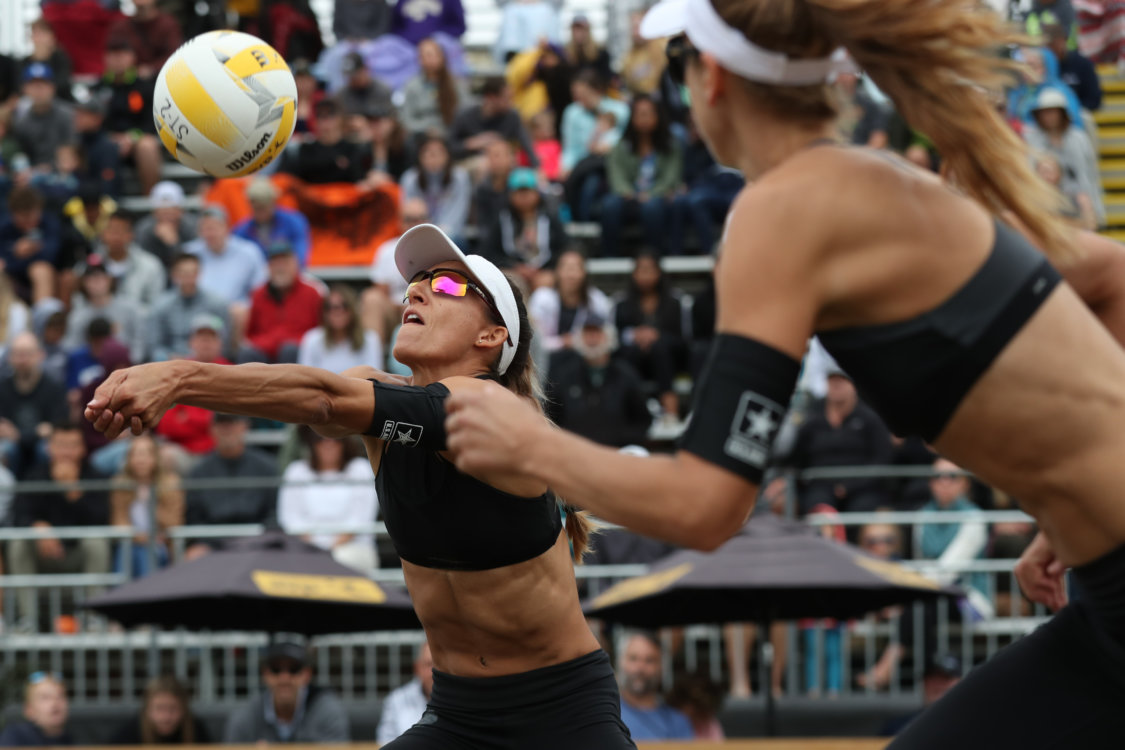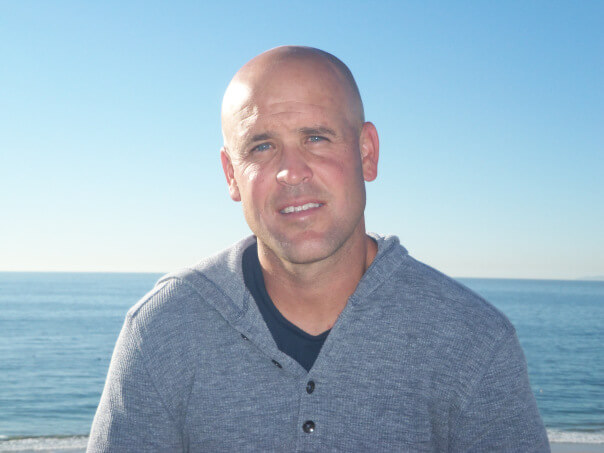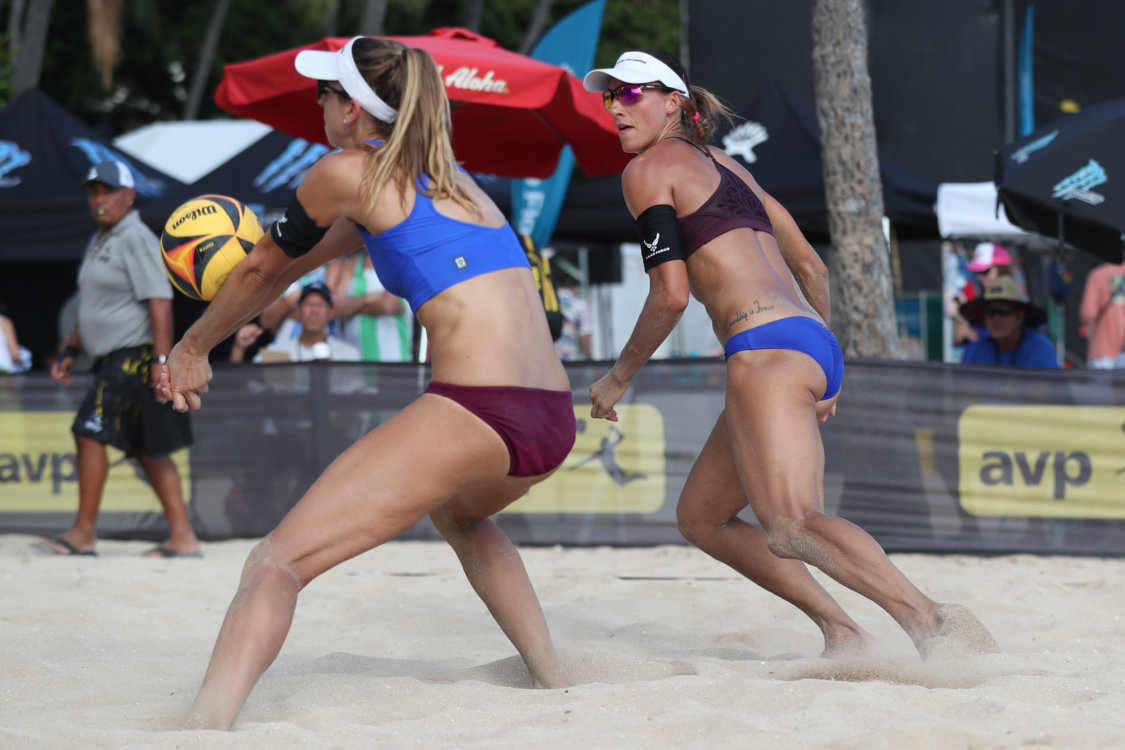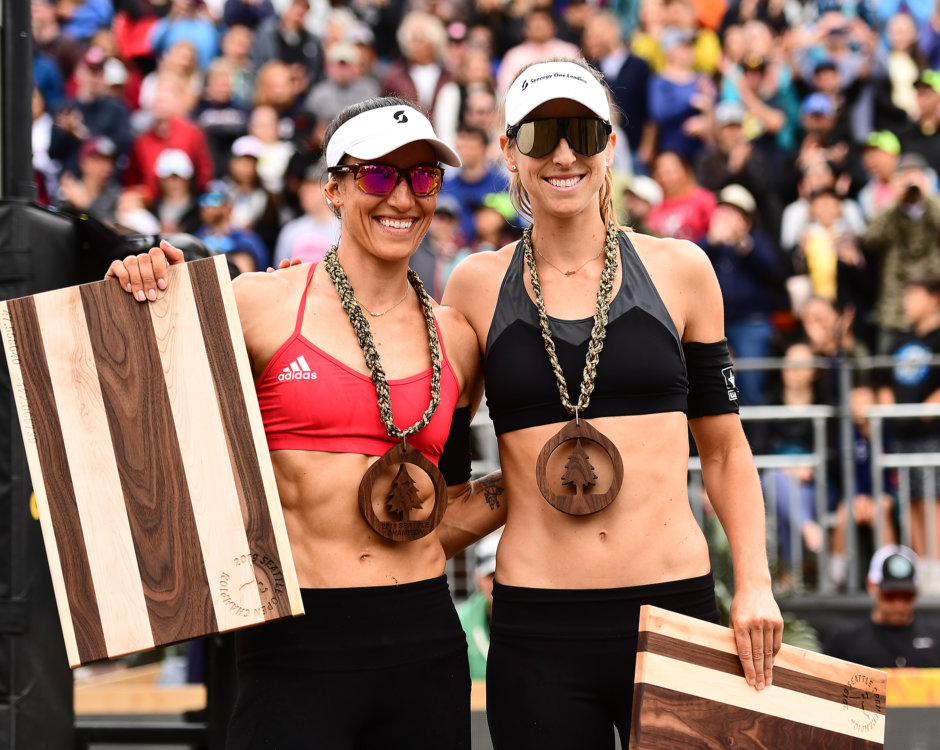Meet Dr. Lee Hancock, a sport psychology coach who works with players on the AVP tour.
Think back to your favorite AVP Final in 2019. Maybe it was one of the ridiculously athletic SoCal Men’s Finals. Or, maybe one of the epic back and forth Women’s Finals. Perhaps it was the hometown hero in the Hawaii Open Men’s Final. Whichever Championship Sunday match, or even a bracket play match you watched, you for sure witnessed some amazing athletes doing some very athletic things over and over and over!
It’s apparent these athletes put a tremendous amount of work into their craft in order to earn the opportunity to play on the AVP tour. Much of that work you can probably imagine. But you may not have considered all of the effort, as some of it isn’t quite visible come match day.
My name is Dr. Lee Hancock, and I’m a sport psychology coach. I work with a number of athletes, including AVP pros that range from gold medalists to athletes that play in Qualifiers. The great folks at AVP asked me to write a piece with my perspective on the game. I hope you enjoy the read!

Spouse. Parent. Partner. Beach volleyball pro athlete.
AVP athletes train up to 5 times a week on the sand—both individually, and as a team. Most, if not all of the athletes, also go to the gym and train there 3-5 times a week. On top of that, many of these athletes also see their physical therapists or chiropractors in order to tend to their bodies. Depending on the time of year, the majority of the athletes also watch film to assess themselves and/or scout their opponents.
Then there are the tournaments.
Tournaments are a time for these athletes to do what they train for, which is play. Depending on the tournament and where we’re at in the season, there can be an immense amount of travel. Sometimes athletes just drive down the street to compete, but when they are playing on international tours, they come from halfway around the world. Once they arrive at a tournament site, there have trainings, game film, and, of course, they need to catch up on their sleep from jetlag. For some athletes, there are also media appearances and interviews. Then, they get to play, and do so with the pressure of sometimes thousands of people watching.
All of these athletes are also partners, spouses, parents, entrepreneurs, and many have other jobs— in other words, they are all people as well as performers. They all have lives outside of the sport, and managing their lives as they face the stress of competing is a major part of their existence. In addition to all the physical training and preparation I mentioned, each athlete needs to train mentally, developing the mental skills they need in order to perform well when it counts. And finally, they do all of this while having a teammate right next to them (literally…on the court, in the hotel room, in the gym, on the airplane, etc.) that is doing the same thing, but differently!
This is where I come in.

What does a sport psychology coach do?
Because I have a limited amount of space for this article, and to allow the more confidential parts of what I offer to remain intact, I have narrowed down my role into three key areas. My role, as a sport psychology coach, is to help athletes as needed:
(1) Manage and, in essence, compartmentalize off-the-court life happenings
(2) Improve individual mental skills
(3) Manage and make the most of the player partnership in order to compete and ultimately win— when it matters most.
I have been fortunate to work with some amazing professional and Olympic athletes over time in various sports. Beach volleyball is tremendously unique because of the individual nature of it, but also because of the lives the players lead and the dynamic relationship between teammates.
Following is a little bit of what we do and how we do it.
Sport Psychology Goal #1: Managing Life
My number one role as I see it, is to work with the athletes as people first. We all know what it’s like to have competing stressors in life. Balancing work, school, families, and finances takes real work. We also know what it is like to try to balance all of this as we progress in our careers. Sport is a unique place to balance these endeavors, as athletes do all of this while physiologically and mentally taxing their bodies to compete for their paycheck. They work while competing directly against their colleagues who are sitting on the other side of the proverbial desk, and they do all of this in front of an audience.
Now, it is absolutely a privilege to play a sport professionally, and if you ask any of these athletes, my guess is that they would say they love it. But balancing everything in order to perform at their highest level does take work.
Frequently, as far as this part of my job is concerned, my role is to be a sounding board for what is going on in their daily lives. The athletes and I have dialogue about whatever they want to talk about— sometimes it is mundane stuff, and sometimes it is very serious life stuff. Life happenings don’t just go away if you’re a professional athlete, and we don’t try to diminish their importance either. Many of these athletes are leading amazing lives outside of their sport, and I love that. Whatever they have going on, we try to frame it in such a way so that it helps them clear their heads and manage their thoughts, making these life happenings non-distracting while they practice and compete. In a way, what we try to do is become professional organizers. We talk through all of the competing happenings in their lives, make sense of those happenings, and then place each of those things in their appropriate place in order to move forward with the task at hand, which is their sport and winning.
It’s not as if we do this and then move on to numbers 2 and 3 below. The managing life piece of my role as a sport psychology coach is intimately intertwined with 2 and 3 below, and as a result, we weave in and out of it as we engage in other sport psychology endeavors.

Sport Psychology Goal #2: Improve Individual Mental Skills
As you think back to the matches and tournaments I alluded to at the start, you might picture a monster block or crazy athletic dig to keep a rally going. The skills that you see in these high-level matches take an immense amount of work to master, under pressure, when it counts. Athletes put in hundreds of hours to master their sport, but no matter how much work they put in, there is variability in how the mind and body perform these skills at various times of the year, month, week, and ultimately, in each match.
Having a toolbox of mental skills to go to when athletes need or want them is key to ensuring that the mental focus is there when it matters most. Sometimes athletes need a number of these skills, and sometimes they only need a few. Sometimes these skills are innate, and other times they need to be worked on for an immense amount of time, similar to their physical work. Either way, mental skills are real, and can be improved upon and utilized just like any other physical skill.
When I work with athletes, I have a process that I go through in order to improve mental skills. Just like a coach, I see what an athlete has and doesn’t have, and then we go from there. Different than physical skills, however, mental skills don’t always obviously present themselves, unless you know when, where, and how to look for them. We take those questions of when, where, and how, and build a plan around them.
We start with self-awareness. Self-awareness is a person’s ability to honestly look at themselves, in critical situations, and to determine what they are doing well and not well. This process takes a few twists and turns, and there are different ways that we work through this throughout the year. Once we determine what we have and don’t have, we educate.
I have coached at a competitive level for multiple decades, created curriculum and programs for multiple sports and learning environments, and am a professor. Thus, I am a teacher at heart, and as a result, I love to empower athletes through education. I don’t just want to explain what might be going on with them. I educate them (and have them educate themselves) on theories and concepts, or other similar athletes’ processes or thoughts, so that they can get a sense of why we are doing what we are doing. This allows us to move through ideas and concepts and build a path of improvement together. I am under no illusion that I have all the answers, and as a result, I like to tap the ultimate resource, the intelligent athlete. By educating the intelligent athlete, I can look to them to help create this plan in a way that perhaps I wouldn’t have thought of through their very capable and unique lens of their life.
Once we do this, we create a plan and implement that plan throughout the season.
As you watch matches on Amazon Prime Video, look for these skills, or lack thereof, in athletes. I do. In fact, when I watch the matches, I watch our team, and other teams, especially at critical times in the match and on the court. I watch body language, I watch interactions, I watch silence and communication, and I take notes on these things from match to match and point to point, in my athletes. There have been a few times this year where I could literally see (to a pretty high degree, as I am not a fortune teller), the moment where a player won or lost a match before it happened. Our goal when I work with individuals is to learn all of the time, as painful as it can be, and ensure that we are prepared to win the big points and big matches. With all of this hard work and introspection, more often than not, we do win.
And then finally, as one of the larger buckets of work I do as a sport psychology coach, we work to manage the partnership.
Sport Psychology Goal #3: Work On The Player Partnership
One of the things you hopefully notice the most about great teams is the dynamic between the athletes. Beach volleyball is such an amazing sport because it is individual, but also a team. I suppose all team sports are individual and team in that the individual must do his or her job and then wait for their teammates to do theirs. But in beach volleyball, the partnership is unique in so many ways. It is because of this and all of its uniqueness that we spend so much time on the individual within the team dynamic and also on the team.
I touched on the individual mental skills work above, but it is germane when talking about the team as well. When we talk team dynamics, my biggest piece of advice is to make sure the individual focuses on themselves first before we get into anything team related. You know when you get on a plane and the safety video instructs you to secure your mask before securing the mask of your child? It’s like that. It may sound selfish, and I suppose it is, but how can you possibly help someone breath if you aren’t breathing yourself? And, in real life, how can you possibly work on your relationship with your significant other or someone important to you, if you can’t or aren’t willing to work on yourself first?
Same thing goes in sports— how can you work on your partnership if you haven’t worked on yourself first?

So, we ask the hard questions as we move along this piece of the puzzle. Are you ready, are you engaged? Are you being honest and trustworthy and taking care of your stuff? Are you ensuring you are being empathetic and communicating effectively on the court and off? And, of course, are you working on all of the things we outlined in (1) and (2) above? There is a great deal of work on the self here, and I am only brushing the surface of this, but looking at the self is a key factor when working on a partnership.
Once we ensure that the person has worked on him or herself, we work on the relationship.
Relationships take work–especially in beach volleyball. These athletes are inextricably linked and spend a great deal of time together. What we see is the two athletes playing together on the weekends. We see them make great plays (and sometimes not such great plays).
What we don’t see? They spend time practicing and playing together, but they also spend a lot of time off the court together. They eat together, fly together, room together, watch film together, and so on. Being able to communicate with each other effectively, in all of these settings, takes work.
We talk a great deal about communication and what that looks and sounds like. We talk about more than just the verbal communication. We talk about the importance of body language, listening, and engaging with each other physiologically. We talk about how to give these things and receive these things. The time spent on these variables ensures that when things go well or poorly we are ready for what’s next.
This communication is the driving force behind the most important thing I do with all of my teams and athletes, which is to establish and ensure a solid culture.
Culture, for me, sets the foundation of a society, a business, a family, and in this case, a team. Think Google, The New Zealand All Blacks, FC Barcelona, or any other successful business or team—there is a culture in place that defines and drives behaviors in order for that entity to not only survive, but thrive. That deep, rich, tradition-laden culture takes time and work to establish.
We have a couple of ways that we establish this culture and the process takes time. As we move through this process, we ensure that everyone involved feels like they have a voice, that they feel safe, and that the direction we are going satisfies their need to build something special. By establishing these rules of engagement, we create a foundation. This foundation is extremely important to have as things go sideways or even positively during a season, as it reminds us of who we are and where we are headed in the long run.
All in a day’s work for a sport psychology coach.
Hopefully this article has provided some insight into the tremendous amount of work the highest-level athletes put in on and off the court, and how I help them in this endeavor through sport psychology coaching. It is enjoyable to work with these hardworking, talented, spirited, and introspective players in this great sport. As you watch these awesome athletes perform at their various AVP events, think about all of the hard work and things that have gone into preparing for their performance and… enjoy the show!
Have questions or business inquiries for Dr. Hancock? The doctor is in at www.DrLeeHancock.com or on Twitter at @DrLeeHancock.